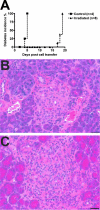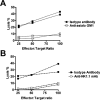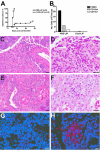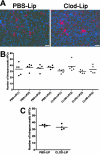In CD4+ T-cell-induced diabetes, macrophages are the final effector cells that mediate islet beta-cell killing: studies from an acute model
- PMID: 17148676
- PMCID: PMC1762478
- DOI: 10.2353/ajpath.2006.060539
In CD4+ T-cell-induced diabetes, macrophages are the final effector cells that mediate islet beta-cell killing: studies from an acute model
Abstract
To understand better how diabetogenic CD4+ T cells induce islet beta-cell death and cause diabetes, a transfer model of acute diabetes using the diabetogenic CD4+ BDC2.5 T-cell clone was established. Transfer of activated BDC T cells into NOD.scid mice resulted in diabetes within a week, characterized by strong inflammatory reaction. Electron micrographs of pancreas depicted macrophages in close contact with beta cells that exhibited signs of apoptosis. Transfer into irradiated recipients inhibited inflammation and the development of diabetes, demonstrating an obligatory role for leukocytes. Selective depletion of neutrophils or natural killer cells had no effect on diabetes induced by BDC2.5 T cells. In contrast, in vivo depletion of phagocytic cells by injection of liposomes containing clodronate abolished diabetes, although inflammation remained present and was characterized mainly by neutrophil infiltration. Treatment with clodronate-liposomes did not affect the antigen-presenting cells within the pancreas. Last, activated macrophages isolated from infiltrated pancreas exhibited cytolytic activity toward primary islet beta cells. Taken together, these results demonstrate that activated macrophages are the key cells mediating islet beta-cell death induced by activated CD4+ T cells.
Figures








References
-
- Tisch R, McDevitt H. Insulin-dependent diabetes mellitus. Cell. 1996;85:291–297. - PubMed
-
- Kikutani H, Makino S. The murine autoimmune diabetes model: NOD and related strains. Adv Immunol. 1992;51:285–322. - PubMed
-
- Nakhooda AF, Like AA, Chappel CI, Murray FT, Marliss EB. The spontaneously diabetic Wistar rat. Metabolic and morphologic studies. Diabetes. 1977;26:100–112. - PubMed
-
- Katz J, Benoist C, Mathis D. Major histocompatibility complex class I molecules are required for the development of insulitis in non-obese diabetic mice. Eur J Immunol. 1993;23:3358–3360. - PubMed
-
- Mora C, Wong FS, Chang CH, Flavell RA. Pancreatic infiltration but not diabetes occurs in the relative absence of MHC class II-restricted CD4 T cells: studies using NOD/CIITA-deficient mice. J Immunol. 1999;162:4576–4588. - PubMed
Publication types
MeSH terms
Substances
LinkOut - more resources
Full Text Sources
Molecular Biology Databases
Research Materials

